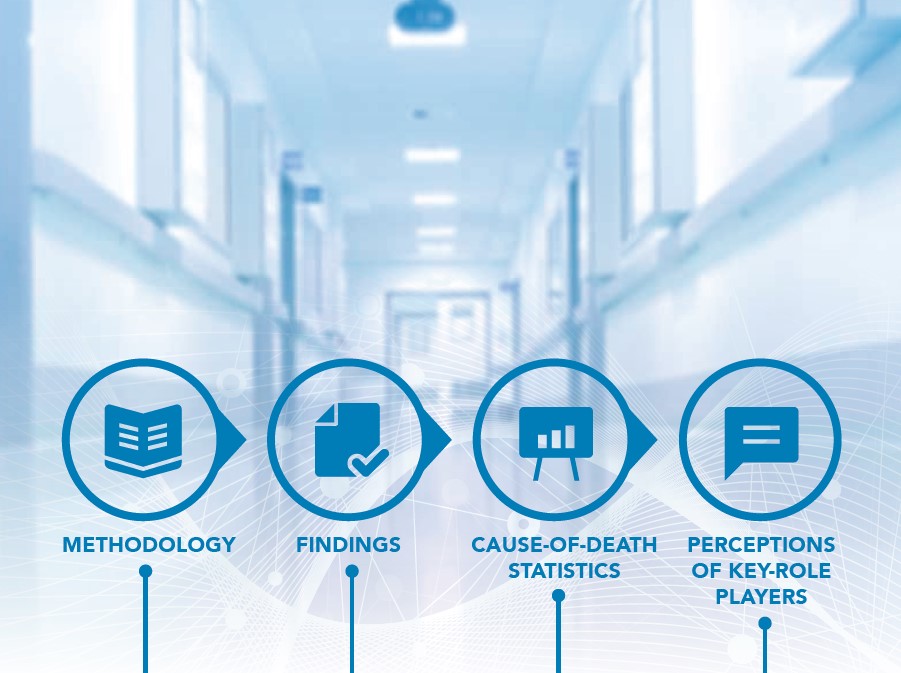A call for action on Cause-of-Death reporting in South Africa - Towards a digitised, high-level functioning and interoperable death registration system
 Cape Town | South Africa has a well-established Civil Registration and Vital Statistics (CRVS) system, but there are indications that the capturing of Cause-Of-Death data is poor. Of concern, particularly, is the misclassification of HIV/AIDS related deaths as other causes. The inaccuracy of injury-related deaths and the extent of causes assigned to unusable codes which do not provide sufficient information about the underlying cause of death.
Cape Town | South Africa has a well-established Civil Registration and Vital Statistics (CRVS) system, but there are indications that the capturing of Cause-Of-Death data is poor. Of concern, particularly, is the misclassification of HIV/AIDS related deaths as other causes. The inaccuracy of injury-related deaths and the extent of causes assigned to unusable codes which do not provide sufficient information about the underlying cause of death.
Having access to accurate COD is essential to inform public health policy, plan health services and improve systems that target interventions that address pressing health challenges. A recent study conducted by researchers from the South African Medical Research Council’s (SAMRC) Burden of Disease Research Unit (BODRU), undertook a rapid assessment to identify the current challenges related to the collection, reporting, and use of COD statistics in South Africa and to identify how these may be addressed.
Significance of findings
South Africa has a mature CRVS system which showed significant improvements post 1994. However, by 2007, the completeness of death registration was over 90%, with no further improvement. The Vital Statistics Performance Index (VSPI) indicated an improvement up until 2009; however, the VSPI declined between 2009-2012, mainly associated with the increasing reporting delay. The quality of COD information has also not improved in the last 10 years, with nearly a third (32%) of all deaths in 2017 identified with an unusable COD (i.e., with insufficient information about the underlying COD), raising questions around the quality of reporting cause-of-death by the certifying doctors.
Particularly concerning is the issue of access to COD information. Except for the Western Cape Mortality Surveillance Project in the early 2000’s, the current system fails to provide information for public health actions, due to a significant delay in the reporting of COD information. Since the 2014 regulation that amended the death notification form, identifiable COD information has become inaccessible to the National Department of Health, preventing its use for public health actions.
Dr Nadine Nannan, Specialist Scientist at BODRU and Principal investigator of the study, said “it is heartening that South Africa has the infrastructure for CRVS but it is problematic that the system is not providing the information needed to guide public health actions.”
Call to action
Urgent action is needed to improve the accuracy of COD data and ensure that it is used for effective public health responses. Cooperation and coordination between the government departments Health, Home Affairs and Stats SA is needed to identify and implement business process improvements, for which a high-level national CRVS committee may be useful. Digitisation of the death registration process will provide opportunities for the country to harness COD death information for public health in a timely fashion. When designing a new system, interoperability/system integration will be critical with collaboration required between all role-players, Information Technology experts, and researchers.
EDITORS NOTES:
See the Full Policy Brief Report | HERE
Read more about the Burden of Disease Research Unit | HERE
For more information:
Dr Nadine Nannan
Specialist Scientist at BODRU
Email: nadine.nannan@mrc.ac.za
Mobile: 072 381 5744

